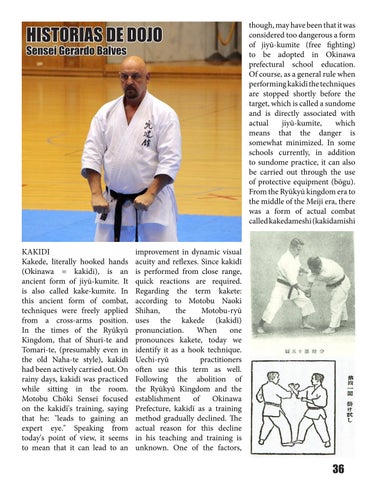HISTORIAS DE DOJO Sensei Gerardo Balves
KAKIDI Kakede, literally hooked hands (Okinawa = kakidi), is an ancient form of jiyū-kumite. It is also called kake-kumite. In this ancient form of combat, techniques were freely applied from a cross-arms position. In the times of the Ryūkyū Kingdom, that of Shuri-te and Tomari-te, (presumably even in the old Naha-te style), kakidī had been actively carried out. On rainy days, kakidī was practiced while sitting in the room. Motobu Chōki Sensei focused on the kakidī's training, saying that he: "leads to gaining an expert eye." Speaking from today's point of view, it seems to mean that it can lead to an
though, may have been that it was considered too dangerous a form of jiyū-kumite (free fighting) to be adopted in Okinawa prefectural school education. Of course, as a general rule when performing kakidī the techniques are stopped shortly before the target, which is called a sundome and is directly associated with actual jiyū-kumite, which means that the danger is somewhat minimized. In some schools currently, in addition to sundome practice, it can also be carried out through the use of protective equipment (bōgu). From the Ryūkyū kingdom era to the middle of the Meiji era, there was a form of actual combat called kakedameshi (kakidamishi
improvement in dynamic visual acuity and reflexes. Since kakidī is performed from close range, quick reactions are required. Regarding the term kakete: according to Motobu Naoki Shihan, the Motobu-ryū uses the kakede (kakidī) pronunciation. When one pronounces kakete, today we identify it as a hook technique. Uechi-ryū practitioners often use this term as well. Following the abolition of the Ryūkyū Kingdom and the establishment of Okinawa Prefecture, kakidī as a training method gradually declined. The actual reason for this decline in his teaching and training is unknown. One of the factors,
36















